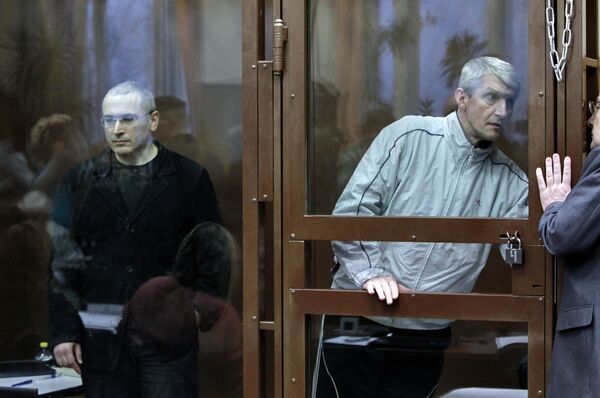Concerns expressed by the U.S. administration over the guilty verdict to Russian ex-oil tycoon Mikhail Khodorkovsky will not prevent the two countries from strengthening their cooperation, U.S. Acting Department Spokesman Mark Toner said.
A Moscow court announced on Monday a guilty verdict to Khodorkovsky, once Russia's richest man and seen as a political threat to Prime Minister Vladimir Putin, and his business partner Platon Lebedev. The two men, who have already spent seven years in jail for fraud and tax evasion from their 2005 trial, face up to seven more years in prison as the court found them guilty of embezzlement and money laundering in the second case initiated in 2007.
The term of the new sentence is expected in a few days' time, when Judge Viktor Danilkin finishes reading the full 250-page verdict.
After the court announced its guilty verdict, the Obama administration issued a statement saying it was "deeply concerned" over the ruling, which "undermines Russia's reputation as a country committed to deepening the rule of law." Russia reiterated by saying that comments from the West were an "unacceptable attempt to exert pressure on the court."
"This second trial and the guilty verdict for Mikhail Khodorkovsky and Platon Lebedev obviously raises questions in our mind about what we'd say – what we call the apparent selective application of the law to these individuals," Toner told a press briefing in Washington when asked to comment on the issue. "We are also troubled by the allegations of serious due process violations and what appears an abusive use of the legal system."
"Fundamentally," he said, the United States had "concerns about human rights in Russia," and was going to "continue to raise those concerns openly with the Russian Government."
At the same time, differences between the countries on some issues do not prevent them from developing cooperation in other spheres.
"We've got a very frank and candid relationship with Russia. We have areas on which we disagree, and there are also areas where we can work constructively together," he said adding that the new arms reduction treaty between Russia and the United States was a "great example of that."
"So I don't believe – no, I don't believe it [the Khodorkovsky issue] is going to be detrimental," he said.
The United States Senate last week ratified the new arms cuts treaty with Russia, with a vote of 71 for and 26 against. The agreement, which is seen as a major foreign policy victory for both U.S. President Barack Obama and his Russian counterpart Dmitry Medvedev, will come into force after ratification by both houses of the Russian parliament.
The new treaty, to replace the START 1 agreement that expired in December 2009, was signed by the two presidents in April in Prague. It trims the Russian and U.S. nuclear arsenals to a maximum of 1,550 nuclear warheads, down from the current ceiling of 2,200.
A top Russian senator said earlier this week that Russia's upper house of parliament, the Federation Council, may ratify the new deal on January 26.
WASHINGTON, December 30 (RIA Novosti)


